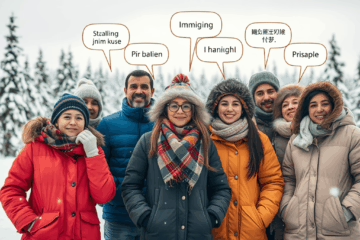Table of contents
For many individuals around the world, obtaining a Canadian visa symbolizes the initial step toward visiting or immigrating to Canada. However, holding a visa does not automatically guarantee entry into the country. This often misunderstood aspect of international travel can lead to confusion and frustration for travelers. Understanding the role of a Canadian visa, the authority of CBSA officers at the Canadian border, and the various factors that can affect entry is crucial for anyone planning to visit Canada.
Understanding the Role of a Canadian Visa
A Canadian visa serves as a pre-entry authorization that allows a foreign national to travel to a Canadian port of entry, such as an airport or land border crossing. It is essentially a document that indicates that a Canadian consulate or embassy has reviewed the individual’s application and determined they meet the necessary requirements to seek entry into Canada. However, a visa does not guarantee entry; it merely allows the visa holder to present themselves at a Canadian border for consideration by the Canada Border Services Agency (CBSA).
The visa application process involves a thorough assessment of an applicant’s background, including their purpose of travel, financial stability, and ties to their home country. While obtaining a visa suggests that the applicant has met these criteria, it does not account for any changes in circumstances between the time of visa issuance and arrival at the border. Therefore, even with a valid visa, the final decision to allow entry into Canada rests with the CBSA officers at the border.
Authority of CBSA Officers at the Canadian Border
CBSA officers are tasked with the critical role of safeguarding Canada’s borders while facilitating the entry of legitimate travelers. They possess the authority to make final decisions regarding the admissibility of individuals seeking to enter Canada. Upon arrival at the border, travelers must present their visa and any other required documentation, at which point CBSA officers will assess whether they meet the conditions for entry.
The authority of CBSA officers extends beyond simply verifying the validity of a visa. They are trained to conduct interviews, review travel and identification documents, and evaluate whether there are any security, health, or immigration concerns that could impact an individual’s admissibility. Officers have the discretion to refuse entry if they believe a traveler poses a risk or fails to meet the entry requirements, even if the traveler holds a valid visa.
Factors Affecting Entry Despite Holding a Visa
Several factors can affect a traveler’s ability to enter Canada, even with a valid visa. One primary consideration is the accuracy and completeness of the information provided during the visa application process. If there are discrepancies or omissions discovered during the border interview, this could raise red flags for CBSA officers. Additionally, any changes in the traveler’s personal circumstances, such as employment status or family situation, may lead to further scrutiny.
Security concerns are another critical factor that can affect entry. CBSA officers conduct background checks and may deny entry if they identify any potential threats or criminal records that were not disclosed during the visa application. Furthermore, health-related issues, such as lacking required vaccinations or presenting symptoms of contagious diseases, can also result in denial of entry. It is essential for travelers to be transparent and prepared to address any questions or concerns that CBSA officers may have.
While obtaining a Canadian visa is an essential step for those wishing to enter Canada, it is important to recognize that it does not guarantee entry at the Canadian border. The authority of CBSA officers and the various factors influencing admissibility underscore the complexity of international travel. Travelers must be prepared to demonstrate their eligibility and address any concerns raised by CBSA officers to ensure a smooth entry process. Understanding the distinction between a visa and actual entry can help manage expectations and reduce potential challenges at the border.
Frequently Asked Questions
-
What is the role of a Canadian visa?
A Canadian visa acts as a pre-entry authorization allowing foreign nationals to travel to a Canadian port of entry.
-
Does a Canadian visa guarantee entry into Canada?
No, holding a visa does not guarantee entry; the final decision lies with CBSA officers at the border.
-
Who decides if you can enter Canada?
CBSA officers at the Canadian border decide if a traveler can enter Canada.
-
What does CBSA stand for?
CBSA stands for Canada Border Services Agency.
-
What are CBSA officers responsible for?
CBSA officers are responsible for safeguarding Canada’s borders and determining the admissibility of travelers.
-
Can CBSA officers refuse entry even if I have a valid visa?
Yes, CBSA officers can refuse entry if they identify any risks or if the traveler fails to meet entry requirements.
-
What documents are required at the Canadian border?
Travelers need to present their visa and any other required documentation such as a passport or travel itinerary.
-
What factors might affect entry into Canada?
Factors include discrepancies in visa application information, changes in personal circumstances, or security concerns.
-
What happens during a CBSA border interview?
CBSA officers assess the traveler’s documents, ask questions about the purpose of travel, and verify admissibility.
-
What should I do if my circumstances have changed since my visa was issued?
Be transparent with CBSA officers and provide any updated documentation that supports your admissibility.
-
Can a criminal record affect my entry into Canada?
Yes, a criminal record can result in refusal of entry if it raises security concerns.
-
What health issues can lead to entry refusal?
Contagious diseases or lack of required vaccinations can result in denial of entry.
-
What is the visa application process?
The process involves submitting an application with details about the purpose of travel, financial stability, and ties to the home country.
-
Can incorrect information in my visa application affect entry?
Yes, providing inaccurate or incomplete information can raise red flags at the border and result in entry refusal.
-
What is a port of entry?
A port of entry is a designated location such as an airport or land border crossing where travelers seek entry into Canada.
-
What is the difference between a visa and entry into Canada?
A visa allows you to travel to a port of entry, but CBSA officers decide whether you can enter Canada.
-
What should I do to prepare for entry into Canada?
Ensure all documentation is accurate, up to date, and complete. Be ready to answer questions from CBSA officers.
-
Can CBSA officers deny entry for any reason?
CBSA officers can deny entry based on security, health, or immigration concerns, or if entry conditions are not met.
-
Is it possible to appeal a CBSA decision?
In some cases, you can request a review of the decision, but the process varies depending on the circumstances.
-
Do CBSA officers have access to my visa application details?
Yes, CBSA officers can review the information provided in your visa application during the entry assessment.
-
What questions do CBSA officers ask at the border?
CBSA officers typically ask about the purpose of your trip, length of stay, and ties to your home country.
-
Can CBSA officers inspect my belongings?
Yes, CBSA officers have the authority to inspect your luggage and personal belongings.
-
What should I do if my entry is denied?
Request clarification from the CBSA officer and follow the steps provided for reapplying or resolving the issue.
-
How can I ensure my travel plans align with my visa conditions?
Review the conditions on your visa and ensure your travel purpose and documents match those conditions.
-
What are some common reasons for entry refusal?
Common reasons include misrepresentation, incomplete documentation, security concerns, or inadmissibility due to health issues.
-
Can a valid visa be canceled at the border?
Yes, CBSA officers can cancel a visa if they determine it was issued based on false or incomplete information.
-
How does CBSA ensure security at the border?
CBSA officers conduct thorough checks on travelers’ documents and backgrounds to ensure compliance with Canadian laws.
-
Is an eTA equivalent to a visa?
No, an eTA (Electronic Travel Authorization) is not a visa but a requirement for visa-exempt travelers flying to Canada.
-
What is misrepresentation, and how does it affect entry?
Misrepresentation involves providing false or misleading information, which can result in visa cancellation or entry refusal.
Discover more from Pax Law Corporation
Subscribe to get the latest posts sent to your email.



0 Comments